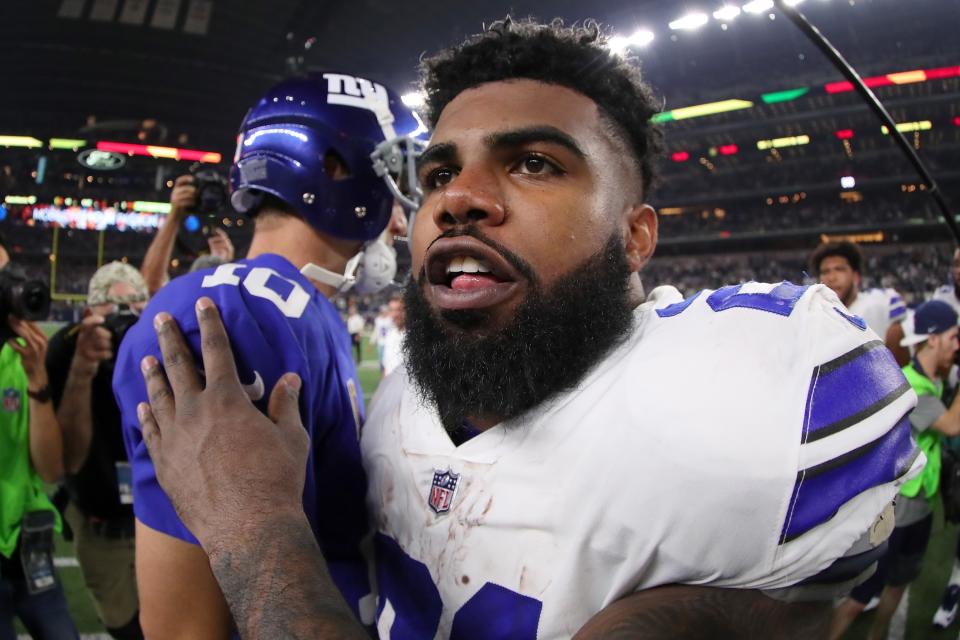Why Jerry Jones has every right to rip Roger Goodell over Ezekiel Elliott's case
ARLINGTON, Texas – Jerry Jones said he wasn’t going to talk about it, wasn’t going to get into Ezekiel Elliott, or the temporary restraining order that delayed his six-game league suspension for domestic violence, or the way the NFL handled the case of the Dallas Cowboys’ star running back.
He is Jerry Jones, though, so pretty soon, he was talking, and it was clear the Cowboys owner wasn’t a fan of the NFL’s process.
“You’ve got to be fair,” Jones said.
Standing outside the Dallas locker room after a convincing 19-3 victory over the New York Giants that featured 140 all-purpose yards from Elliott (104 on the ground, 36 receiving), Jones was asked about the NFL’s approach to player discipline.
Namely, should the league even be involved in disciplining players for off-field issues when local prosecutors don’t pursue charges – as was the case with Elliott and his alleged abuse of a former girlfriend in Columbus, Ohio?

“This really has to do with what our league’s responsibility is, given the privilege that we have as a league,” Jones said, referencing the NFL’s broad powers from the collective bargaining agreement. “What is our responsibility to do it in a very good and acceptable way? We certainly stand to be critiqued and examined in that area. Everybody else is; everybody that has ever made a decision [is critiqued].
“So why should it surprise us when we adjudicate, or the equivalent to adjudicate, over a privilege that we’ve got in our relationship with players, and we don’t do it in a fair way? Why should it surprise anybody if we get slapped? It doesn’t surprise me. You’ve got to be fair.”
Jones is arguably the most powerful owner in the NFL, and if he wants to begin pushing for a new investigative process then it will carry weight.
Under commissioner Roger Goodell, the league has taken a more active role in punishing player conduct away from the field of play. However, the NFL’s system is often viewed as heavy-handed, arbitrary and based on the concept of coming to a conclusion first – and then building a case at all costs to fulfill it.
With Elliott, the league has been assailed for not mentioning that its lead investigator in the case, Kia Wright Roberts, recommended Elliott not be suspended because she did not find corroborating evidence or witnesses to the accuser’s story. Roberts was the only person from the league to speak to the accuser.
While the NFL has the right to ignore or overrule her recommendation, by trying to hide it rather than explain its reasoning, the league corrupted the entire case. Because Roberts’ opinion didn’t come out until after the ruling, Elliott was unable to call Roberts or Goodell as witnesses. The NFLPA cried foul.
In granting Elliott his restraining order, U.S. District Judge Amos Mazzant agreed with the union and blasted the NFL.
“Fundamental unfairness infected this case from the beginning, eventually killing any possibility that justice would be served,” Mazzant wrote in a blistering 22-page opinion.
It clearly took the NFL’s incompetency to affect one of his players for Jones to fully grasp what is going on. A close look at the sausage-making of NFL investigations tends to do that.
Jones, for instance, dismissed Elliott’s case was in any way similar to the deflate-gate case that ended with a four-game suspension of New England Patriots quarterback Tom Brady for his role in a supposed scheme to lower the inflation levels of footballs. In the end, the league was ridiculed for its duplicity and lack of evidence in making the ruling.
“Well, [deflate-gate] was about whether or not the player had misrepresented to the commissioner,” Jones said. “We’ve got rules that if you don’t tell the truth to the commissioner, then you can get sanctioned. Those are rules.
“That’s not the case here. Zeke gave him everything … everything he had to have here. So these are different issues.”
We’ll leave it to Patriots owner Robert Kraft to call Jones and try to reeducate him on the facts of the case. At this point, Jones might be more open to hearing it.
Either way, it’s clear Jones is in line with the NFLPA, federal judges and virtually any bystander paying attention that the league has significant problems with how it goes about investigating and disciplining players.
The flawed system damages everyone. It’s not merely players who may be unfairly convicted.
In this case, that could include Elliott’s former girlfriend, whom the NFL believes, trusts and has deemed a victim. If there is anyone the league should be protecting, it’s her. Yet because of its own arrogance, it chose to try to rig the system. So Elliott was starring on NBC on Sunday, and many fans think she’s a liar.
The league office should be mortified. It probably isn’t.
Maybe now Jerry Jones understands what so many in other cities have been saying for years. Even if the intentions are good (such as holding players accountable for domestic violence), the league’s tactics are so bad they undermine everything.
“I don’t have anything to say about the legal aspects with Zeke, the timing or anything like that,” Jones claimed when he first stepped up to speak to the media.
Fourteen minutes later he couldn’t help himself, he couldn’t hold back. The truth is, he shouldn’t be quiet about any of this.
A man with this much power and influence should be speaking up, publicly, privately and – preferably – directly to Roger Goodell.
More from Yahoo Sports:
• NFL brothers send strong national anthem message
• Watch: Top 5 plays of NFL Week 1
• Jeff Passan: Breaking down two of baseball’s stunning streaks
• Dan Wetzel: Jerry Jones has every right to rip Roger Goodell
